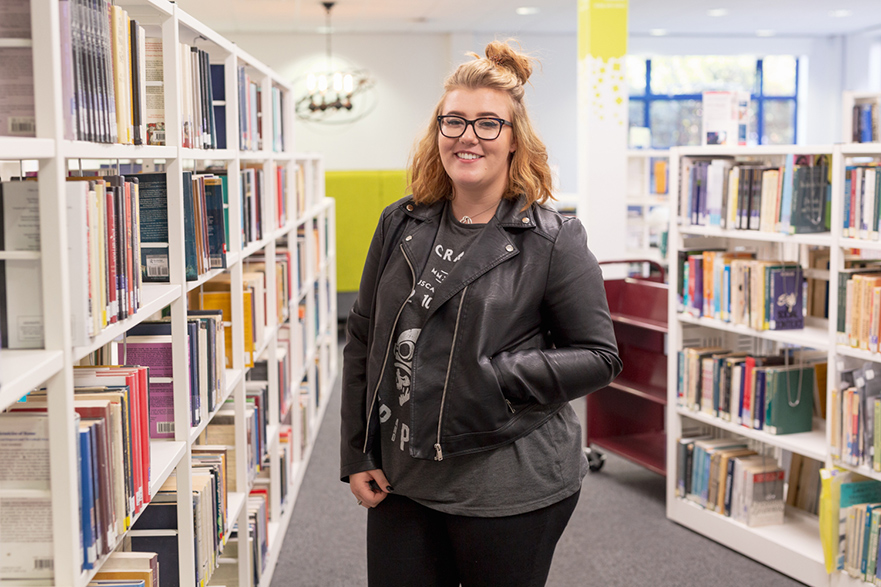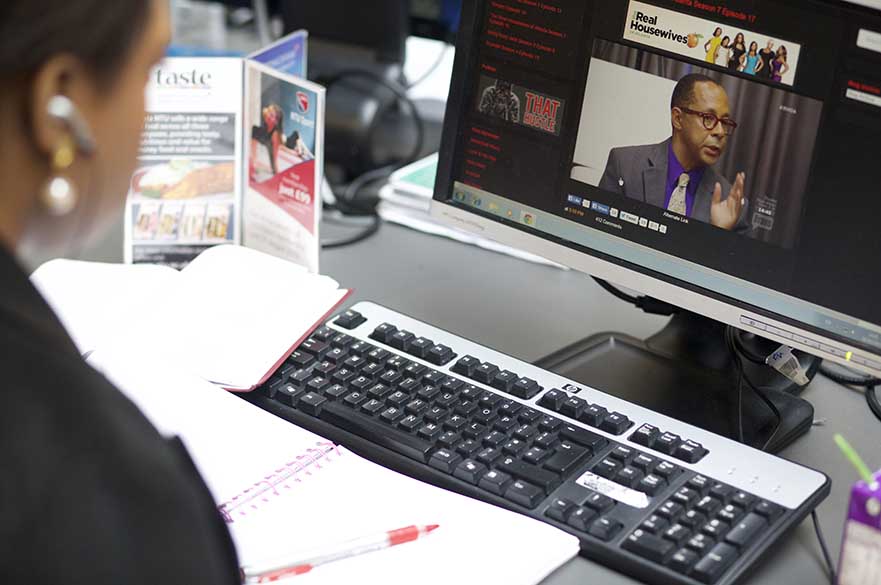About this course
-
Gain the prestigious Cambridge Certificate in Teaching English to Speakers of Other Languages (CELTA), a professional qualification that will open doors to employment worldwide.
-
Complete a work experience placement, meaning you’ll graduate with valuable industry experience.
-
Our students love us! 98% of Linguistics students are positive about the teaching on their course (National Student Survey 2023)
-
Study abroad with one of our partner institutions, ISEP or Turing Scheme, including in Australia, Canada, USA, Chile, Japan, Europe and many more.
Language has power. It can shape a mind, influence an idea, or even start a movement.
Linguistics is the science of how language works. And language influences all the big questions in everyday life, from culture and gender, to technology, discrimination, health, law, social justice, ecology, and conservation.
BA (Hons) English Language and Linguistics is a practical course designed to develop you into a highly skilled communicator. If you wish to specialise in English language teaching you can also gain the prestigious Cambridge Certificate in Teaching English to Speakers of Other Languages (CELTA), a professional qualification that will open doors to employment worldwide.
Career-boosting elements are fully embedded throughout the course with a focus on applying your knowledge and theory with hands-on, practical sessions. You will explore how language is used in the real world and how it can tackle the big problems including racism, gender equality, and climate change.
You will be supported with a personalised learning environment, a wide range of optional modules, and a range of innovative assessment types, including blogs and videos, professional expert reports, and teaching material.
You can even gain valuable full-time work experience with a sandwich course option, or spend time studying - or even teaching - abroad.
Find out more about English Language and Linguistics
We’re running activities for 16 - 18 year olds to give you a taster of what it is like to study at NTU.
Once you register your interest, we’ll email you information nearer to the day.
Thursday 19 June, 10am - 3pm
Tuesday 24 June, 10am - 3pm
University Language Programme
Studying a language in addition to your degree through the ULP not only allows you to extend your studies to languages other than English but also gives you the chance to prepare for study abroad as part of your sandwich year. So, if you plan to teach in Japan or Spain, or study at one of our partner universities around the world, studying a foreign language will give you a head start.
What you’ll study
During your first year you will learn the basic skills required to identify, analyse and describe language. From sound and sentence structure to literal and social meanings, you will explore how language is used and understood. You will apply your knowledge to real-life situations, as well as reflecting on your own and your peers’ language use and that of powerful institutions.
In the second year you can specialise your study with a choice of pathways - a work placement, an international experience, or continue your academic study including an option to study for a CELTA qualification.
In year three you may choose to take a year-long placement, either in the UK or overseas, to put your learning into practice.
In the final year, you can specialise even further with a range of optional modules, including an option to advance your TESOL knowledge and skills and explore how language is important for understanding health, legal processes, identity, and sustainability.
Core modules
Sounds of English
Explore the theoretical framework and practical skills for phonetic description and analysis. Learn to transcribe English accurately using phonetic symbols and familiarise yourself with a range of standard and non-standard World English accents.
Morphology and Syntax
Identify the morphological structure of words in English, including the structure and function of inflectional and derivational morphemes. You will learn how words can be divided into different parts of speech, and how to identify these in English.
Language in Everyday Life
Apply the study of language in real-life situations and reflect on your own and others' language use. You'll write an academic blog on the importance of language in your everyday life and through this, be able to understand more about how you are expected to write and research at university.
Semantics and Pragmatics
Examine the relationship between what is said and what is meant by answering questions such as what is meaning as it relates to words and sentences, and how is meaning impacted by context.
Introduction to TESOL
This introduction to practical issues and theoretical concepts involved in Teaching English to Speakers of Other Languages (TESOL), lays the foundations for a future career in language teaching and related industries. You will learn about lesson planning and have the opportunity to watch experienced teachers in action as well as practice your own teaching through mock-classes in module sessions with others in the class.
Language, Society and Culture
This module will introduce you to major concepts in discourse analysis, examining language-use beyond the level of the sentence. You will develop skills in analysing spoken and written language across contexts and the role that discourse plays in the construction of identity and ideology.
Core modules
Problems of Language
Learn about the various methods of data collection in applied linguistics, such as recording and transcribing conversational data, designing questionnaires, carrying out interviews and conducting online data collection.
Comparative Linguistics
Explore the diversity of linguistic structures around the world by investigating the lexical, grammatical, and phonological structures of languages other than English. Do speakers of different languages face different challenges when learning a second or other language?
Language and Big Data
In this module you will develop skills in the quantitative analysis of language, including identifying meaningful patterns in very large datasets and in analysing and interpreting the results from linguistic experiments. You will apply linguistic analysis in answering real-world questions about language.
Optional
In the second half of the year you can choose from:
Pathway 1 - Extended work-like experience
Pathway 2 - International exchange
Pathway 3 - 3 optional modules from the list below
Practical English Language Teaching
Use your learning in real-world teaching classes, including preparing lesson plans, materials and evaluations to gain CELTA which is recognized around the world (additional fees may apply - see Fees and Funding below details)
Language, Inequality and Social Justice
Social justice is an important research topic that is inextricably linked to language use. Whether it’s racial abuse on social media, prejudice against regional accents in schools, or sexist advertising campaigns, discrimination is a social issue that affects us all in one way or another. This module examines how language can be used to both promote social justice and tackle prejudice and discrimination in a range of institutional and everyday contexts. This module is especially appealing if you wish to pursue a career in advocacy, human resources or journalism.
Communication Disorders
Explore how language can be affected by a range of physical and mental conditions, as well as looking into the profession of Speech and Language Therapy.
Language and Local Community
Examine the ways in which language can vary in communities, considering issues such as accent, dialect and identity. Develop a critical and informed stance about language-related issues in sociolinguistics including issues such as gender, sexuality, ethnicity and age.
Intercultural Communication at Work
Gain the knowledge, skills and strategies to build your intercultural communication competence. Analyse and reflect on the impact of culture(s) on your values, assumptions, perceptions, expectations, and behaviours. Build successful verbal and non-verbal communication strategies in different intercultural settings.
You may choose to take an optional year-long placement in Year Three, either in the UK or overseas.
Placements options are wide ranging. You could find yourself working with a local council on a public health campaign, reviewing teaching materials at a college, teaching English overseas, or working on supporter communications for a charity or NGO. You may also choose to study abroad for all or part of the year.
You will be supported by our experienced Employability Team to source a suitable placement.
Core modules
Major Project in Linguistics
This is your opportunity to explore a subject of your own choice in more detail. This can take the format of a dissertation or another agreed output - such as a report, and allows you to collect and analyse naturally occurring language data.
Optional
Ecolinguistics
Discussions around ecology and sustainability are increasingly important in modern society. This module introduces you to how discourses around sustainability and ecology have an impact upon modern attitudes around ecological preservation and sustainability. You will examine language use from various contexts, including in the farming industry, by local, national, and international governments, and by marketing companies and businesses.
Forensic Linguistics
Examine language and the law, crime and justice. You will review language in the criminal justice system, including the linguistic disadvantages that witnesses, victims and suspects face in legal contexts. You will also look at the role of the forensic as expert witness and the different ways in which language analysts can provide investigative assistance to the police and reliable evidence to the courts.
Language and Health
Learn how language plays an integral part in the provision of healthcare and the communication of health-related topics. You will consider questions like: how do institutions aim to inform and educate the wider public around issues relating to public health? How can language be used to create and challenge ideologies about ability and disability in modern society? What are the best practice for healthcare workers to communicate to their patients?
Second Language Acquisition and Pedagogy
Learn theories and explore research findings that relate to the acquisition and teaching of second languages. This module is particularly useful if you wish to go into a career teaching English as a second/foreign language.
Advanced TESOL
This continuation from the CELTA module in Year Two extends and develops your teaching skills to effectively work in specialist areas such as online classrooms, English for academic purposes (EAP), and English for specific purposes (ESP). You will learn how to engage learners in online teaching, how to develop materials to meet the needs of EAP and ESP students, and how to teach English to such advanced learners. Importantly, you will gain experience teaching in these contexts, allowing you to apply the theory discussed in the classroom to real practice. Teaching may include micro-teaching to peers and teaching with actual language learners.
Language, Gender and Sexuality
Explore the relationships between language, gender and sexuality by examining past and contemporary debates in the field, such as whether language is inherently sexist, and how increased awareness of gender diversity impacts on how people use language and are referred to by others. You will also examine how expectations of gendered behaviour can infiltrate our daily lives, from newspaper representations of female celebrities to the gendering of consumer products.
We regularly review and update our course content based on student and employer feedback, ensuring that all of our courses remain current and relevant. This may result in changes to module content or module availability in future years.
Your tutors
How you're taught
How will I learn?
You will be taught through a variety of teaching and learning experiences which will include:
- lectures and seminars
- interactive workshops
- group projects and presentations
- case studies and transcripts
- company briefs and projects
- teaching practice
The course is highly practical with hands-on teaching sessions and analysis of real-world examples and projects. You will develop your own materials which you can use on placements and in your career portfolio.
International exchange
You’ll also have the option to take part in an international exchange at a partner university. These options will enable you to gain impressive international experience, and broaden your perspective and career ambitions.
You’ll experience other cultures, travel the globe and open your eyes to a world of opportunities. Our exchange partnership with a number of international universities enables you to live and study in another country in your second year. Find out more about international exchanges.
Learn a new language
Alongside your study you also have the opportunity to learn another new language. The University Language Programme (ULP) is available to all students and gives you the option of learning a totally new language or improving the skills you already have. Learning a new language can enhance your communication skills, enrich your experience when travelling abroad and boost your career prospects. Find out more about the University Language Programme.
Further information
100% of NTU's research submitted to the 'Communication, Cultural & Media Studies, Library & Information Management' Unit of Assessment was rated world-leading or internationally excellent in terms of research impact (REF 2021), and this latest research feeds directly into your course.
How you're assessed
We use a varied and diverse range of coursework assessments to develop your skills and support your progress. These include digital projects, reviews, case-studies, essays, presentations and reports.
Our innovative approach to assessment means that in Year One you will develop and enhance a complementary set of key skills for success in second and third year, and throughout the degree the varied assessment pattern will enable you to engage with the past and prepare for your future through an exciting array of projects
Contact hours
If you’re struggling with a topic or require additional support or guidance, you can arrange to see your tutors in small groups or one-to-one, to discuss essay plans or to seek some specific academic guidance.
It is the nature of the subjects offered in the School of Arts and Humanities, however, that much of your time will be spent engaged in independent study. We recognise that this marks a change of culture from school or college, and we have in place a system of study support to help you adapt to this.
Careers and employability
Key transferrable skills are emphasised throughout the course and there are opportunities to develop links with organisations and potential employers.
As a graduate of this course, you will be a language and communication expert with a broad and global skillset that will allow you to enter a multitude of careers. These include:
- language teacher
- speech therapist
- public relations specialist
- digital marketing specialists
- journalist
- editor
- copywriter
- technical and medical writers
- translator
- communication director and other strategic roles in public service
- policing and legal services
- specific management policy roles linked to EDI agendas
- community development roles that require an understanding the theoretical, ethical and practical issues involved in intercultural communication.
Campus and facilities
You’ll mainly be studying in the Djanogly building with access to facilities including a student kitchen and collaboration space.
NTU’s City Campus has everything you’ll need to stay busy between lectures. As well as the Boots Library and its beautiful roof garden, there’s our stylish Students’ Union building and two-storey, 100-station gym; a whole host of cafés, bars, restaurants and food outlets for every taste; our much-loved Global Lounge; performance and rehearsal spaces for musicians; and much, much more!
Take a few steps off campus and you’ll find yourself in the heart of Nottingham — England’s original ‘rebel city’. It’s one of the UK’s top 10 student destinations, and one of Europe’s top 25. Enjoy a booming indie arts scene, pop-up galleries, the nationally renowned Nottingham Contemporary, two A-list theatres, the iconic Broadway (voted one of the world’s top 100 independent cinemas by Total Film), and a constant rotation of events and exhibitions.
Take our virtual tour to get a real feel for the campus.
Here are some of the free services, student discount and benefits you'll get studying at NTU
We've carefully considered what benefits and services you need for your studies, so when you join NTU you'll get free printing and materials credits, access to our free WiFi, a copy of Microsoft Office, and can even borrow a laptop if yours is out of commission.
For life outside your lectures, you'll enjoy access to over 60 sports clubs and 130 student societies, discounted travel and bike hire, free language learning, award-winning student support and an entertainment programme which is second to none.
See all the benefits and free services you will enjoy as an NTU student.
Societies
Current students run societies in a range of Humanities and Arts subjects including History, Medieval, Film, Filmmaking, Philosophy, Politics and International Relations, and the Book society.
There are also a number of media channels which our students get involved in such as the NTU radio station FlyLive, our student magazine Platform, and TV station TrentTV.
Find out more about student societies at the Student Union website.
Entry requirements
UK students
Standard offer: 112 UCAS Tariff points from up to four qualifications
Contextual offer: 104 UCAS Tariff points from up to four qualifications.
To find out what qualifications have tariff points, please use our tariff calculator.
Additional requirements for UK students
There are no additional requirements for this course.
Contextual offers
If you don’t quite meet our entry requirements, we might be able to make you a lower offer based on a range of factors, including your background (such as where you live and the school or college you attended), your experiences and your individual circumstances (you may have been in care, for example). This is called a contextual offer, and we get data from UCAS to help make these decisions. We do this because we believe everyone with the potential to succeed at NTU should have the opportunity to do so, no matter what barriers you may face.
Meeting our entry requirements
Hundreds of qualifications in the UK have UCAS Tariff points attached to specific grades, including A-levels, BTECs, T Levels and many more. You can use your grades and points from up to four different qualifications to meet our criteria. Enter your predicted or achieved grades into our Tariff calculator to find out how many points your qualifications are worth.
Other qualifications and experience
NTU welcomes applications from students with non-standard qualifications and learning backgrounds, either for year one entry or for advanced standing beyond the start of a course into year 2 or beyond.
We consider study and/or credit achieved from a similar course at another institution (otherwise known as credit transfer), vocational and professional qualifications, and broader work or life experience.
Our Recognition of Prior Learning and Credit Transfer Policy outlines the process and options available for this route. If you wish to apply via Recognition of Prior Learning, please contact the central Admissions and Enquiries Team who will be able to support you through the process.
Getting in touch
If you need more help or information, get in touch through our enquiry form.
International students
Academic entry requirements: 112 UCAS Tariff points from up to four A levels. We accept equivalent qualifications from all over the world. Please check your international entry requirements by country.
English language requirements: See our English language requirements page for requirements for your subject and information on alternative tests and Pre-sessional English.
Additional requirements for international students
If you need help achieving the academic entry requirements, we offer a Foundation preparation course for this degree. The course is offered through our partner Nottingham Trent International College (NTIC) based on our City campus.
English language requirements
View our English language requirements for all courses, including alternative English language tests and country qualifications accepted by the University.
If you need help achieving the language requirements, we offer a Pre-Sessional English for Academic Purposes course on our City campus which is an intensive preparation course for academic study at NTU.
Other qualifications and experience
If you have the right level of qualifications, you may be able to start your Bachelors degree at NTU in year 2 or year 3. This is called ‘advanced standing’ entry and is decided on a case-by case basis after our assessment of your qualifications and experience.
You can view our Recognition of Prior Learning and Credit Transfer Policy which outlines the process and options available, such as recognising experiential learning and credit transfer.
Sign up for emails
Sign up to receive regular emails from the International Office. You'll hear about our news, scholarships and any upcoming events in your country with our expert regional teams.
Getting in touch
If you need advice about studying at NTU as an international student or how to apply, our international webpages are a great place to start. If you have any questions about your study options, your international qualifications, experience, grades or other results, please get in touch through our enquiry form. Our international teams are highly experienced in answering queries from students all over the world.
Policies
We strive to make our admissions procedures as fair and clear as possible. To find out more about how we make offers, visit our admissions policies page.













